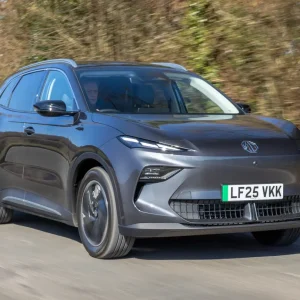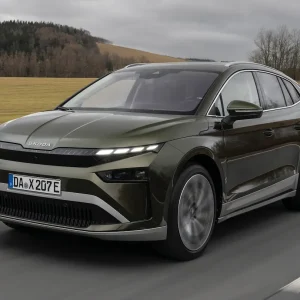The electric versions of the Corsa and Mokka, launched in 2020 and 2021 respectively, have proved to be key models in the Vauxhall brand’s renaissance under new Stellantis management. Especially considering the change in importance as we move towards the 2030 new ICE engine ban. Now, after catching our attention with its attractive blend of competitive pricing and plug-in hybrid versions, our current family car of the year, the Astra, is the next model to be offered with electric power.
It has been another busy year already for Vauxhall’s family hatch and Sports Tourer estate range, as at the start of this year sportier GSe versions were launched. The Astra Electric is something very different, again ahead of the Griffin-badged brand being fully electric by 2028.
The Astra Electric has a 155hp synchronous electric motor, which develops 270Nm of torque and is powered by Vauxhall’s next-generation 54kWh lithium-ion battery. Acceleration to 62mph takes 9.2 seconds, with the top speed being 105mph, and despite this performance, Vauxhall are claiming a credible 258-mile range. Although, sadly due to the short time we had with this car we couldn’t verify this. The Astra Electric is however fitted with a standard high-performance heat pump, so this Vauxhall’s efficiency should still be good, even if the weather is extremely hot or cold, and it’s capable of 100kW rapid charging, equalling a 10-80% charge in 30 minutes.
The Astra Electric starts off smoothly, keenly, and quietly in ‘Normal’ mode, which we think is fine for most everyday driving you’ll do in this Vauxhall EV, although there are also ‘Eco’ and ‘Sport’ driving modes. The only obvious difference we could spot between the modes is a change in the throttle mapping. With ‘Eco’ being harder and slower to accelerate and ‘Sport’ making the throttle more sensitive. Performance is best described as willing up to urban limits, then it seems to level out.
There are no surprises with the Astra Electric’s dynamics either. Fitted with specific 215/45 R18 tyres, this Vauxhall dispatches road imperfections in much the same way the ICE version does – with impressive refinement. Although, the extra weight of the battery makes the bumps more obvious. The brakes seem far less snatchy and easier to modulate than with the plug-in hybrid version.
Already a looker in either hatch or estate form, the Electric Sports Tourer comes later. Outside the changes for the Electric version are subtle and well-executed. It gets a bespoke front bumper, 18in wheels, a black roof and ‘e’ badging.
Inside, Electric versions of the Astra remain distinctive and minimalist and unchanged from the ICE version. Space in the front is fine, but rear space is no better than average, although the 352-litre boot for the hatch is practically shaped and unaffected by the fitment of the battery.
Electric models are an attractive addition to the already appealing Vauxhall Astra range. We like the fact there are few compromises to make the move to EV here. There’s even a three-year PCP with £263 monthly payments already in place, that should attract business buyers.
Vauxhall Astra Electric Ultimate
P11D: £40,090
Residual value: 41.1%
Depreciation: £23,604
Fuel: £3,593
Service, maintenance and repair: £1,308
Cost per mile: 47.50p
Range: 258 miles
CO2 (BIK %): 0g/km (2%)
BIK 20/40% a month: £13/£26
Luggage capacity: 352 litres
Battery size/power: 54kWh/155hp





